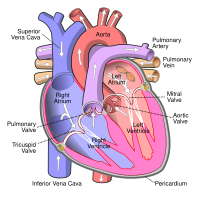
Photo from wikipedia
Aortic valve stenosis (AS) is the most common heart valve disease in North America and Europe leading to an increased risk of heart failure and death. A multidisciplinary evaluation of… Click to show full abstract
Aortic valve stenosis (AS) is the most common heart valve disease in North America and Europe leading to an increased risk of heart failure and death. A multidisciplinary evaluation of symptoms, individual risk profile, echocardiographic parameters, biomarkers assessment is required for an appropriate clinical and therapeutic management of AS. The natriuretic peptides (NPs) represent an important biomarker for diagnostic, prognostic and therapeutic purposes in several cardiovascular diseases. The present review article provides an overview of the current knowledge on the role of NPs in the pathogenesis, diagnosis, risk stratification and potential therapeutic implications in AS. C-type natriuretic peptide (CNP) level is reduced in AS, favoring the formation of calcified aggregates and an increased expression of bone-related transcripts and proteins (Runx2, osteonectin, osteocalcin, alkaline phospahatase). Consistent results were obtained through the inhibition of the type A and B natriuretic peptide receptors (NPRA, NPRB) and of the proprotein convertase furin expression. Increased plasma B-type natriuretic peptide (BNP) level contributes to monitor the progression of AS and to identify patients who would most benefit from an early therapeutic intervention, such as surgical or transcatheter aortic valve replacement. Moreover, a risk stratification of AS patients that takes into account the NPs level has a major impact toward the occurrence of heart failure, syncope and sudden cardiac death. Finally, the development of novel therapeutic strategies, such as the neprilysin inhibition, may represent a suitable pharmacological approach for the treatment of AS. Due to the above mentioned multiple roles, NPs represent key players in AS development, management and treatment.
Journal Title: Journal of molecular and cellular cardiology
Year Published: 2019
Link to full text (if available)
Share on Social Media: Sign Up to like & get
recommendations!